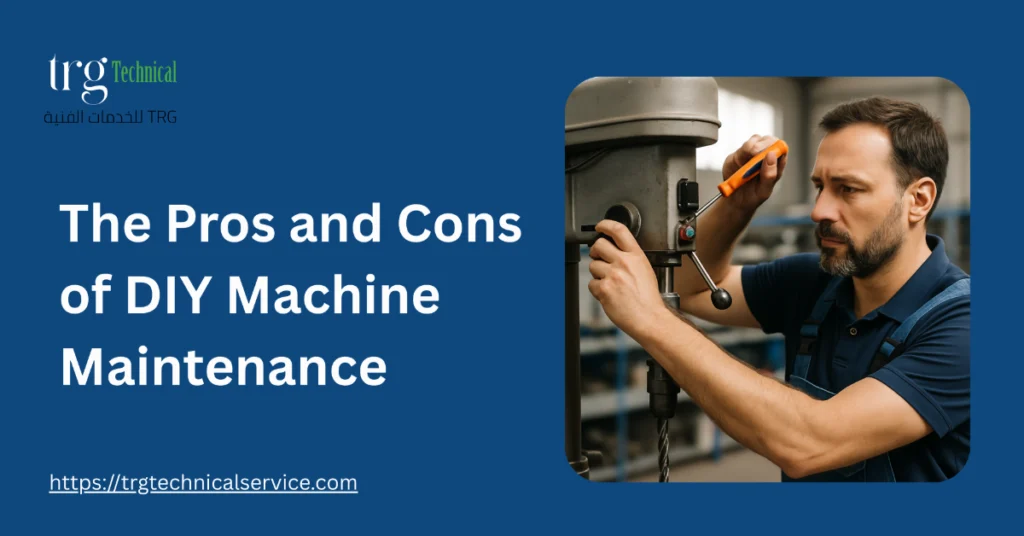The Pros and Cons of DIY Machine Maintenance

IIf you’re a homeowner or business owner with machinery whether it’s HVAC systems, power tools, or industrial-grade equipment you’ve probably wondered: Should I handle maintenance myself or hire a pro? It’s a fair question, and the answer isn’t always black and white.
DIY machine maintenance can be incredibly rewarding but it can also become a source of expensive mistakes if not handled properly. In this article, we’ll break down the real pros and cons of doing your own machine maintenance so you can make an informed decision based on your time, skill level, and risk tolerance.
What Counts as “Machine Maintenance”?
Let’s be clear machine maintenance can range from basic upkeep (like changing filters or tightening bolts) to complex diagnostics and repairs involving electrical systems, hydraulic mechanisms, or computerized controls. Not all machines are created equal, and neither are the risks involved.
The Pros of DIY Machine Maintenance
1. Cost Savings
One of the biggest advantages of doing your own maintenance is the potential to save money. Hiring professionals especially specialists can be expensive, with labor sometimes costing more than the parts themselves. If you’re handy and already own tools, DIY may make economic sense.
2. Immediate Response
When something breaks down, you don’t have to wait days for a technician to arrive. With the right tools and a bit of knowledge, you can troubleshoot and get your machine running again right away—ideal for situations where downtime means lost productivity or discomfort.
3. Hands-On Learning
There’s a long-term benefit to getting familiar with your equipment. You’ll understand how it operates, what sounds or behaviors signal problems, and how to prevent minor issues from becoming major ones. This type of hands-on knowledge is hard to beat—and you won’t get it by outsourcing every task.
4. Control Over Materials and Quality
When you handle your own repairs, you choose the parts, tools, and lubricants—ensuring quality control and potentially extending the lifespan of your equipment. You also avoid the markup that some service providers tack onto materials.
5. Custom Scheduling
No need to rearrange your day around a technician’s availability. You can handle maintenance during your downtime, after hours, or on weekends whatever fits your schedule.
The Cons of DIY Machine Maintenance
1. Risk of Mistakes
This is the biggest downside: one wrong move and you could cause more damage. Miswiring a motor, overtightening a bolt, or using the wrong lubricant might turn a $50 problem into a $500 one or worse, void your warranty.
2. Safety Hazards
Machines especially industrial or electrical ones come with risks. High voltage, sharp blades, hot surfaces, and moving parts can cause serious injuries if you’re not trained or properly equipped.
3. Time Investment
Sure, you might save money but what about your time? Researching, diagnosing, and fixing a problem could take hours (or days) if you’re not experienced. If time is money for you, those hours might be better spent elsewhere.
4. Incomplete Fixes
A lot of DIY fixes are just that fixes, not full repairs. Without the right tools or diagnostic equipment, you might not get to the root cause of a problem, leading to repeated breakdowns.
5. Limited Access to Parts and Tools
Professional technicians often have access to proprietary tools, software, or parts that aren’t available to the general public. If your machine needs a special calibration tool or a manufacturer-only replacement part, you might find yourself stuck halfway through the job.
- When DIY Works Best
- DIY maintenance is often suitable for:
- Simple tasks like cleaning filters, replacing belts, or lubricating parts
- Well-documented systems with manuals and tutorial videos
- Homeowners or hobbyists who enjoy hands-on projects
- Backup or non-critical machines where a small mistake isn’t catastrophic
If you’re confident and well-informed, there’s no harm in tackling these tasks yourself.
Read also: How Machine Servicing Can Save You Money on Repairs
When to Call the Pros
There are certain situations where professional help is the safer, smarter call:
- The machine is under warranty and DIY work could void it
- The repair involves electricity, gas, or high-pressure components
- You don’t have the right tools or safety gear
- The problem keeps recurring despite your fixes
- The machine is critical to your daily operations and downtime is costly
In those cases, a professional might cost more upfront but could save you thousands in the long run.
Hybrid Approach: The Best of Both Worlds?
For many property owners, the sweet spot is knowing which tasks to DIY and which to delegate. Do the basics yourself regular cleaning, inspections, tightening, and lubrication but keep a pro on speed dial for diagnostics, tune-ups, and anything complex or safety-related.
Final Thoughts
DIY machine maintenance can be a great way to save money and learn more about your equipment but it’s not always the smartest choice. Know your limits. If you’ve got the time, interest, and tools go for it. But if the job involves serious risks or affects high-value machines, don’t hesitate to bring in the pros.


